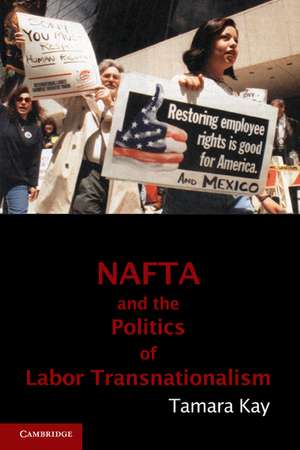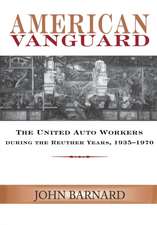NAFTA and the Politics of Labor Transnationalism: Cambridge Studies in Contentious Politics
Autor Tamara Kayen Limba Engleză Paperback – 6 feb 2011
| Toate formatele și edițiile | Preț | Express |
|---|---|---|
| Paperback (1) | 251.27 lei 6-8 săpt. | |
| Cambridge University Press – 6 feb 2011 | 251.27 lei 6-8 săpt. | |
| Hardback (1) | 639.78 lei 6-8 săpt. | |
| Cambridge University Press – 30 ian 2011 | 639.78 lei 6-8 săpt. |
Din seria Cambridge Studies in Contentious Politics
-
 Preț: 178.72 lei
Preț: 178.72 lei -
 Preț: 162.90 lei
Preț: 162.90 lei -
 Preț: 197.42 lei
Preț: 197.42 lei - 9%
 Preț: 626.73 lei
Preț: 626.73 lei -
 Preț: 210.35 lei
Preț: 210.35 lei -
 Preț: 220.85 lei
Preț: 220.85 lei -
 Preț: 199.89 lei
Preț: 199.89 lei - 8%
 Preț: 564.60 lei
Preț: 564.60 lei -
 Preț: 289.10 lei
Preț: 289.10 lei -
 Preț: 238.15 lei
Preț: 238.15 lei -
 Preț: 232.48 lei
Preț: 232.48 lei -
 Preț: 160.00 lei
Preț: 160.00 lei -
 Preț: 203.50 lei
Preț: 203.50 lei -
 Preț: 231.38 lei
Preț: 231.38 lei -
 Preț: 263.79 lei
Preț: 263.79 lei -
 Preț: 274.27 lei
Preț: 274.27 lei -
 Preț: 227.61 lei
Preț: 227.61 lei - 11%
 Preț: 637.54 lei
Preț: 637.54 lei -
 Preț: 474.87 lei
Preț: 474.87 lei -
 Preț: 225.50 lei
Preț: 225.50 lei -
 Preț: 269.58 lei
Preț: 269.58 lei -
 Preț: 201.59 lei
Preț: 201.59 lei -
 Preț: 229.56 lei
Preț: 229.56 lei -
 Preț: 238.13 lei
Preț: 238.13 lei -
 Preț: 306.73 lei
Preț: 306.73 lei - 11%
 Preț: 553.62 lei
Preț: 553.62 lei - 11%
 Preț: 694.04 lei
Preț: 694.04 lei -
 Preț: 231.05 lei
Preț: 231.05 lei -
 Preț: 305.33 lei
Preț: 305.33 lei -
 Preț: 201.59 lei
Preț: 201.59 lei -
 Preț: 230.51 lei
Preț: 230.51 lei - 14%
 Preț: 791.97 lei
Preț: 791.97 lei - 11%
 Preț: 555.03 lei
Preț: 555.03 lei - 11%
 Preț: 554.68 lei
Preț: 554.68 lei - 11%
 Preț: 459.73 lei
Preț: 459.73 lei
Preț: 251.27 lei
Nou
Puncte Express: 377
Preț estimativ în valută:
48.09€ • 49.90$ • 40.19£
48.09€ • 49.90$ • 40.19£
Carte tipărită la comandă
Livrare economică 15-29 martie
Preluare comenzi: 021 569.72.76
Specificații
ISBN-13: 9780521132954
ISBN-10: 0521132959
Pagini: 338
Ilustrații: 5 b/w illus. 9 tables
Dimensiuni: 152 x 229 x 20 mm
Greutate: 0.45 kg
Ediția:New.
Editura: Cambridge University Press
Colecția Cambridge University Press
Seria Cambridge Studies in Contentious Politics
Locul publicării:New York, United States
ISBN-10: 0521132959
Pagini: 338
Ilustrații: 5 b/w illus. 9 tables
Dimensiuni: 152 x 229 x 20 mm
Greutate: 0.45 kg
Ediția:New.
Editura: Cambridge University Press
Colecția Cambridge University Press
Seria Cambridge Studies in Contentious Politics
Locul publicării:New York, United States
Cuprins
1. Introduction: NAFTA and labor transnationalism; Part I. The Emergence of Transnationalism: 2. Labor nationalism: diplomacy and distance among unions prior to NAFTA; 3. NAFTA as catalyst: constituting transnational actors and interests; 4. Constituting transnational labor rights; 5. Seizing the opportunity NAFTA provided; Part II. Variations in Transnationalism: 6. Missing the opportunity NAFTA provided; 7. Explaining variation in the emergence of labor transnationalism; Part III. Conclusions: 8. Global governance and labor transnationalism.
Recenzii
“In the bourgeoning interdisciplinary field of transnational studies, Professor Kay once again has demonstrated that she is the leading sociologist of transnationalism of her generation with this pathbreaking book. A must-read!”
—Sanjeev Khagram, University of Washington
“Challenging the conventional wisdom that economic globalization has left national labor movements isolated and defenseless, Kay argues — almost heretically in the case of NAFTA — that regional economic integration at the top can also spark transnational solidarity from below. In a classic case of unintended consequences, we see how NAFTA, through its governance institutions and side agreements, provided an opening for savvy organizers to build a more inclusive and unified North American labor movement to resist global capital’s unrelenting ‘race to the bottom.’ NAFTA and the Politics of Labor Transnationalism is a superb study that offers important lessons for scholars and activists alike.”
—Howard Kimeldorf, University of Michigan
“Anybody concerned with social movements in the 21st century, and especially the prospects for labor transnationalism, needs to read this book. Tamara Kay shows why and how a few U.S. and Mexican unions were able to turn NAFTA, which they had viewed as a threat, into an opportunity for new cross-border strategies. The results point to promising ways forward for global movements.”
—Chris Tilly, Director of the Institute for Research on Labor and Employment, University of California, Los Angeles
—Sanjeev Khagram, University of Washington
“Challenging the conventional wisdom that economic globalization has left national labor movements isolated and defenseless, Kay argues — almost heretically in the case of NAFTA — that regional economic integration at the top can also spark transnational solidarity from below. In a classic case of unintended consequences, we see how NAFTA, through its governance institutions and side agreements, provided an opening for savvy organizers to build a more inclusive and unified North American labor movement to resist global capital’s unrelenting ‘race to the bottom.’ NAFTA and the Politics of Labor Transnationalism is a superb study that offers important lessons for scholars and activists alike.”
—Howard Kimeldorf, University of Michigan
“Anybody concerned with social movements in the 21st century, and especially the prospects for labor transnationalism, needs to read this book. Tamara Kay shows why and how a few U.S. and Mexican unions were able to turn NAFTA, which they had viewed as a threat, into an opportunity for new cross-border strategies. The results point to promising ways forward for global movements.”
—Chris Tilly, Director of the Institute for Research on Labor and Employment, University of California, Los Angeles
Notă biografică
Descriere
This book argues that, collectively, unions can help shape how the rules governing the global economy are made.

















